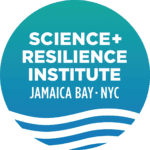Research Consortium
Brooklyn College, CUNY
Brooklyn College, a senior college of the City University of New York (CUNY), currently hosts the Institute. The Institute has been formally established with temporary space on the campus of Brooklyn College and plans are underway for a new facility located on Jamaica Bay.
The National Park Service and the City of New York
In 2012, the City of New York and the National Park Service came together around a unified vision of Jamaica Bay as an urban park. This vision includes the integration of cutting-edge research efforts from across the natural and social sciences, drawing upon climate science, engineering, and sustainability and resilience studies to create a comprehensive program of research, monitoring, education, and outreach. Part of this was commitment to a partnership with the CUNY-led consortium in the formation of the Institute, which is aligned with the City of New York and National Park Service’s vision for a revitalized, restored Jamaica Bay. The General Management Plan of the park lays out this vision in detail.
The Jamaica Bay-Rockaway Parks Conservancy
The Jamaica Bay-Rockaway Parks Conservancy (JBRPC) is a public-private partnership established in 2013 that is dedicated to improving the 10,000 acres of public parkland throughout Jamaica Bay and the Rockaway peninsula for local residents and visitors alike. With its partners at the National Park Service and the New York City Department of Parks & Recreation, JBRPC works to expand public access; increase recreational and educational opportunities; foster citizen stewardship and volunteerism; preserve and restore natural areas, including wetland and wildlife habitat; enhance cultural resources; and ensure the long-term sustainability of the parklands, including the development of the Science and Resilience Institute.
Science and Resilience Institute Advisory Councils
The Institute aims to represent and engage a diversity of voices from the Bay. This mandate is fused directly into the organizational structure of the Institute through its standing advisory councils. These councils advise the director and executive leadership on the governance of the Institute and also serve as settings for dialogue and coordination around science-driven decision-making and management of the Bay. A few of these councils are currently in emerging form. The Public Agency Council represents a spectrum of voices from within city, state and federal agencies. The Stakeholder Advisory Council advises the executive leadership on issues of community interest. A Science Advisory Council will help set the direction of the Institute’s research agenda.
Resilience community
The Institute considers itself part of a community of practitioners focused on building resilience in Jamaica Bay and the wider region. This community ranges from idea incubators like the Rockefeller Foundation, innovative agency programs such as HUD’s Rebuild by Design, and the committed efforts of community groups throughout Jamaica Bay. The Rockefeller Foundation has supported many of these efforts through their 100 Resilient Cities initiative, which is dedicated to helping cities around the world become more resilient to the physical, social and economic challenges that are a growing part of the 21st century. As part of this, the Foundation has set its sights on Jamaica Bay and been a key driver of recent efforts to put resilience into practice there, including through financial and advisory support of the Science and Resilience Institute and Conservancy.






